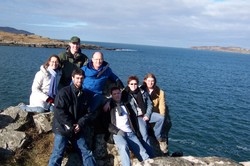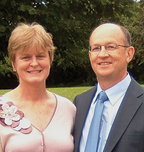After more than 30 years of working for reconciliation in Northern Ireland, Presbyterian mission co-worker Doug Baker has seen tensions lessen and violence abate.
However, the tall, graffiti-covered metal walls that separate some unionists and nationalists neighborhoods remind him that much work is still to be done.
Baker helps Presbyterian Church (U.S.A.) partner churches bring together unionists, who are mostly Protestant and who want to remain part of the United Kingdom, and nationalists, who are mostly Catholic and who want to unite with the Republic of Ireland.
The dialogues, Baker says, have helped build understanding and nurture relationships. “In the first 15 years of my ministry in Northern Ireland, we spent a lot of time debating whether we can accept one another as Christians, and how the answer to that should determine how we treated each other,” he says. The discussions have moved beyond that, he explains, because of a “rediscovery of what’s at the heart of the gospel, the command to love God and to love our neighbor and what that requires of us in the setting where our neighbor is different to ourselves in some respect.”
Religion has contributed to Northern Ireland’s division, Baker acknowledges. “That’s religion but there’s a growing recognition that the gospel itself, when truly understood and lived out, actually has the power to heal and unite.”

Presbyterian mission worker Doug Baker has been a YAV site coordinator since 1994.
Baker, who serves alongside his wife, Elaine, invests much time preparing future church leaders. He teaches ministerial students about reconciliation and since 1994 he has been site coordinator for the PC(USA)’s Young Adult Volunteer (YAV) program in Northern Ireland.
YAVs are between 19 and 30 and serve for one year in communities of need in seven countries, including the United States. About one-third of YAV alumni go to seminary, and many others serve the Presbyterian congregations as lay leaders. In Northern Ireland, the YAVs plant seeds of reconciliation primarily in their work with children and youth.
“I see them making wonderful contributions not only in what they contribute during the year they serve in Northern Ireland, but in the leadership roles that they are taking on in PC(USA) when they return to the United States,” Baker says.

